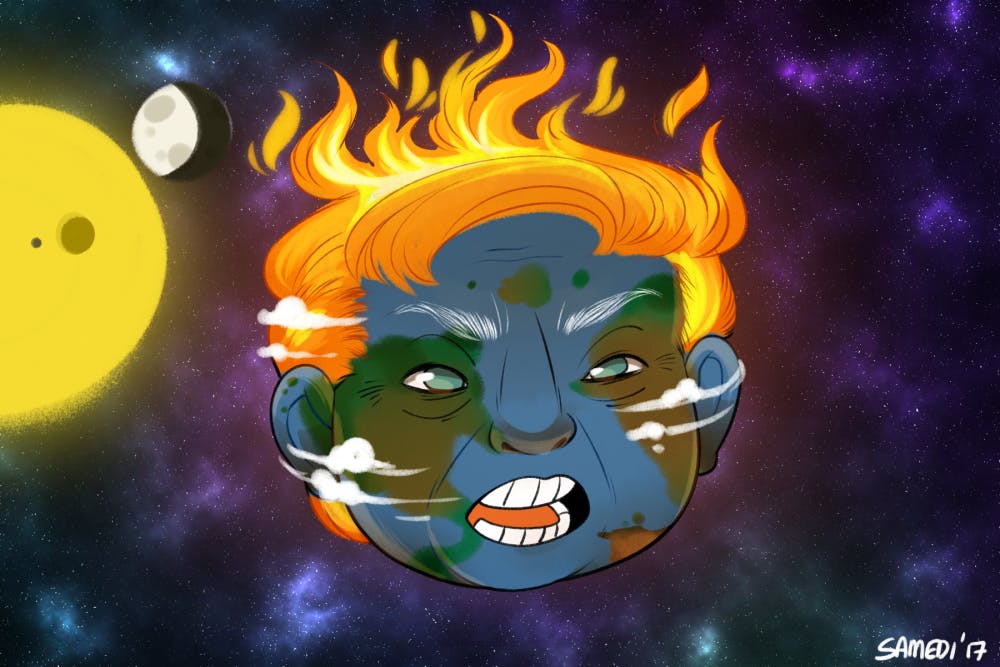The Trump administration’s future effects on the environment are as unpredictable as the president himself, Arizona sustainability researchers said.
Due to the administration’s silencing of the Environmental Protection Agency, Arizona authorities on climate change said it is difficult to foresee the government’s future impact on the environment.
Benjamin Ruddell, a professor at NAU School of Informatics, Computing and Cyber Systems, works with ASU professors to understand the impact of climate change on individual ecosystems.
“We’re taking a big picture approach,” Ruddell said. “So what we’re trying to do, is we’re trying to detect large scale changes in the function of ecosystems based on changes in their water, carbon and energy flows.”
Vast quantities of information from Fluxnet, a network of instruments that collect data about what is going in and out of ecosystems, allow Ruddell to interpret which changes affect ecosystems the most, he said.

Oak Ridge National Laboratory Distributed Active Archive Center (ORNL DAAC). 2013. FLUXNET Maps & Graphics Web Page. Available online (http://fluxnet.ornl.gov/maps-graphics) from ORNL DAAC, Oak Ridge, Tennessee, USA Accessed November 5, 2013
He said that shifts in average air temperature, average waterfall and phenology, or how organisms adapt their life cycles, affect each ecosystem differently.
Still, Ruddell said there is one aspect that stands above the rest.
“We found that temperature is the big issue in terms of functional shifts,” Ruddell said.
Functional shifts can decrease the biodiversity of ecosystems, which results in less overall adaptability.
“It is possible, of course, that as the world keeps changing, we’re going to see a totally new type of ecosystem emerge,” Ruddell said. “That could always happen, but it’s much more likely that we’re going to see one ecosystem shift and become more like an ecosystem that already exists.”
Unaffiliated from his research team, Ruddell said the Trump administration could very well speed up climate change, but there is still hope.
Ruddell said if more carbon dioxide and other emissions are released into the air, then the average temperature of the Earth will increase. Considering his research, he said this does not bode well for the environment.
Yet, this may not be as big of an issue as it sounds, Ruddell said.
“We have reached a situation where renewable energy, regardless of the Clean Power Plan or federal regulation, is now becoming more cost-competitive than coal or fossil fuels,” Ruddell said.
The coal industry is becoming less economically sustainable, Ruddell said, which might lead to its demise.
“There is nothing that the Trump administration can do at this point, short of banning renewable energy, to save the coal industry,” Ruddell said.
Despite this trend, Ruddell said the Trump administration’s silencing of the EPA is cause for alarm.
“If you care about the environment, I would be concerned,” Ruddell said.
Sonja Klinsky, a sustainability professor at ASU who specializes in analyzing the public’s responses to environmental policy, also said the EPA’s condition is worrisome.
“I think the American taxpayers ought to be up in arms over this,” Klinsky said.
She said that without access to the information generated by the EPA, it will be much more difficult to make the right decisions concerning environmental issues.
Klinsky said that it is difficult to forecast how the administration will affect the environment.
“One of the challenges is that we don’t know the extent of Trump’s plan … which makes any predictions very difficult,” Klinsky said.
The challenge of predicting the future of climate change also influences how people view environmental policy, she said.
“We think that what is is more likely than what could be,” Klinsky said.
In other words, she said people have a hard time envisioning a future unlike their current situation, which can lead to stagnation on public policy.
When it comes to Trump’s statements that environmental regulations harm industry, Klinsky said this is not usually the case.
“The reality is, many industries have been regulated. And when push comes to shove, you know what? 99 percent of them go on to survive,” Klinsky said.
Hailey Baker, a junior majoring in sustainability, said she was angry at the administration’s handling of environmental policy.
“The first day he went into office, he deleted the entire page on climate change from the government website and … I think that is something that is going to anger people,” Baker said.
Baker said that the U.S.’s former leadership in environmental policy is likely to change hands.
“I don’t have high hopes for their policy helping the environment,” Baker said.
Reach the reporter at chawk3@asu.edu.
Like State Press on Facebook and follow @statepress on Twitter.




